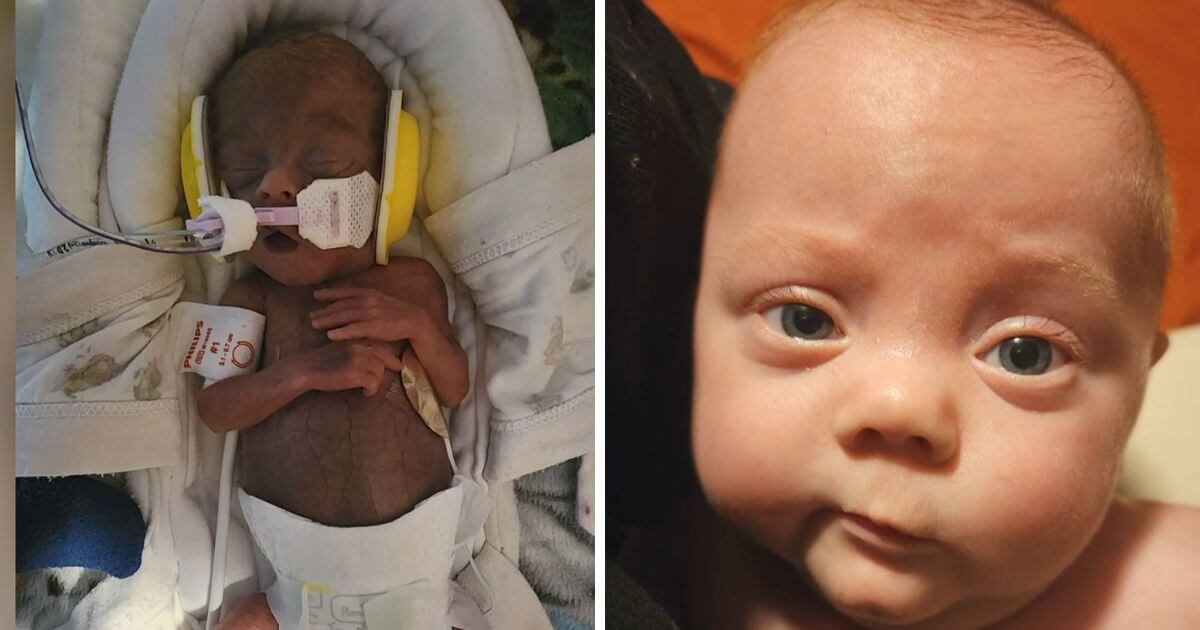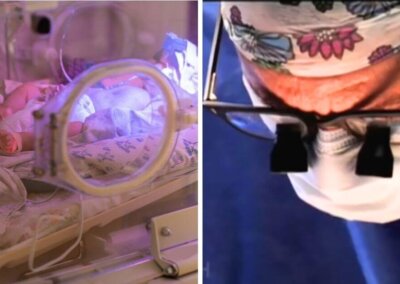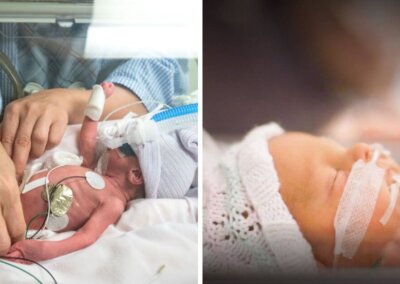A premature baby boy, born at just 22 weeks and three days and who spent 137 days in the neonatal intensive care unit, beat the odds and is now eight months old.
Jadeyn Gajeski, baby Henry’s mother, was attending a routine 20-week pregnancy checkup when she found out her pregnancy was not going as well as she thought.
“They did the ultrasound and they saw that my cervix was shortened to nothing. It was unmeasurable is how they worded it”, Jadeyn said. “They stitch your cervix, just try to hold [the] baby in longer. It did not last”.
Barely two weeks later, Jadeyn had to be rushed to Sanford Medical Center to give birth. Her son Henry, born at 22 weeks and three days, was immediately taken to the neonatal intensive care unit (NICU), which was the only facility in the area capable of looking after such a premature baby.
“You don’t think you’re going to come home with a baby”
Henry weighed less than a pound when he was born. His mother described the experience as “terrifying”.
“It’s very scary and it just doesn’t seem real that you’re actually going to have a baby so soon. You know, you were just celebrating. You’re halfway through your pregnancy and here you are. So you have no idea how it’s going to go”, she said.
“You can’t breathe. Your chest is tight. You’re just constantly worried. And then you see him and he’s see-through and he is hooked up to all these things, You don’t think you’re going to come home with a baby. You really don’t”.
However, Henry was in the hands of a specialist NICU team, who supported him for 137 days in hospital. One of the doctors, Dr Mohamed Mohamed, said that the hospital has seen about a dozen very premature babies like Henry in the last five years, and that they have a survival rate of about 60% at this hospital.
“We have a micropreemie program, which is a specialized program to take care of the little ones”, Dr Mohamed said. “The smaller you are, you’ll have immature organ systems and that includes the brain, the small intestine, the lungs, the heart and the skin, the immune system. Every system might cause or pose a risk of having a life-threatening event. In the case of Henry, he needed to be on the breathing machine right away. And he stayed on the breathing machine for two months”.
Four months later, he was able to go home
In addition to being on the breathing machine, Henry experienced a perforated bowel and an infection of the heart while in hospital.
However, after over four months, he was discharged from the hospital and is now mostly healthy at eight months old.
Dr Mohamed said “We put [in] the effort, and we work hard toward having a good outcome. But when I see Henry now in front of me and he’s interacting and he’s doing very well, this is what gives me joy for my job”.
“It really makes you feel like you have a miracle in your hands”, Henry’s mother said. “He is the strongest boy I know. I mean, he’s just amazing. I know he is really meant to be here”.
“It’s the best thing ever. I mean, you just look at him randomly at home and you get tears. You do. Because he’s a miracle”.
More premature babies are surviving from 22 weeks gestation
At 22 weeks, Henry was born below the current UK abortion limit of 24 weeks. Babies like Henry highlight a clear contradiction at the heart of our abortion law and current medical practice.
On the one hand, the law permits ending the lives of babies at 22 and 23 weeks, and, on the other hand, current medical practice strives to save the lives of many babies born prematurely at 22 or 23 weeks gestation.
The annual abortion statistics for England and Wales in 2021 (the most recent year for which a full year of data is available) reveal that 755 ‘ground C’ abortions were performed when the baby was at 22 or 23 weeks gestation (ground C is the statutory ground under which the vast majority of abortions are permitted and there is currently a 24-week time limit for abortions performed under this statutory ground).
Spokesperson for Right To Life UK, Catherine Robinson, said “It is so uplifting to hear of stories like Henry’s and the dedication of the medical team who supported him through so many difficulties in hospital. Very premature babies demonstrate how resilient even the youngest humans in our society are and point to the humanity of the children in the womb”.












